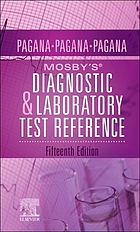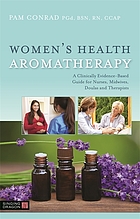Subject - Health

What is Evidence-Based Practice (EBP)?
Evidence-Based Practice (EBP) is the process of combining:
-
The best available research evidence
-
Clinical expertise
-
The patient’s values, preferences, and circumstances
-
Information from the practice context
to make well-informed decisions about patient care.
According to Straus, Glasziou, Richardson, and Haynes (2019), EBP means “integrating the best available research evidence with clinical expertise and the patient’s unique values and circumstances.”
Hoffman, Bennett, and Del Mar (2024) add that it also requires considering the context in which care is provided — such as available resources, policies, and setting.
EBP originally developed from Evidence-Based Medicine (EBM) but now applies across all health professions, including nursing, allied health, and social care.
To determine if a study is 'evidence-based' requires that you 'critically appraise' it. For critical appraisal tools refer to the Critical appraisal tab.
Pyramid of study types
This image graphically represents the hierarchy of evidence provided by the National Health and Medical Research Council (NHMRC)
Graphic courtesy of: https://guides.library.unisa.edu.au/SystematicReviews/Protocols
For NHMRC designation of levels of evidence go to: A guide to the development, implementation and evaluation of clinical practice guidelines
This guide will help you to find and use all the available useful sources to help you get just what you need fast!
Starting Your Search
Here you can access helpful catalogue searches, where we've completed some of the first steps to get you started in your searching.
- Evidence Based Practice
- Evidence Based Chinese Medicine
- Evidence Based Complementary and Alternative Medicine
- Evidence Based Counselling
- Evidence Based Nursing
- Evidence Based Nutrition
- Evidence Based Public Health
Featured Resource
Mosby's Evidence-Based Nursing Monographs
Mosby's Evidence-Based Nursing Monographs: the latest evidence about common clinical problems, including summaries of key studies, tagged by level of evidence.
Understanding Study Designs
A study design is the blueprint for how research is conducted. Knowing the design helps you:
- Judge the strength and reliability of the evidence.
- Select the correct appraisal tool.
- Decide whether results are applicable to practice.
Main Types of Study Designs
1. Randomised Controlled Trial (RCT)
- Participants are randomly assigned to groups.
- One group receives the intervention; the other receives a placebo or standard care.
- Best for testing whether a treatment works because randomisation reduces bias.
2. Cohort Study
- Follows a group (cohort) over time.
- Compares those exposed to a factor with those not exposed and tracks outcomes.
- Can be prospective (looking forward) or retrospective (using past records).
- Good for identifying links between exposures and outcomes.
3. Case–Control Study
- Starts with people who have a condition (cases) and compares them to those without it (controls).
- Looks back in time for possible causes or risk factors.
- Useful for rare diseases; more prone to bias due to reliance on memory and records.
4. Cross-Sectional Study
- Observes a defined population at a single point in time or time interval.
- Measures exposure and outcome simultaneously.
- Useful for describing patterns or associations, not cause and effect.
5. Systematic Review and Meta-Analysis
- Systematic Review: Identifies, appraises, and synthesises all relevant studies on a specific question using explicit methods.
- Meta-Analysis: Uses quantitative methods to combine results across studies into an overall estimate.
6. Qualitative Research
- Explores experiences, perceptions, and meanings rather than numerical data.
- Uses interviews, focus groups, and observations.
- Meta-synthesis: Systematically synthesises findings across multiple qualitative studies.
7. Case Report / Case Series
- Describes one or more patients with a specific outcome or presentation.
- No control group; useful for new or unusual cases but provides weaker evidence.
8. Diagnostic Accuracy Study (Prospective, Blind Comparison to a Gold Standard)
- Evaluates a new diagnostic test against the best available gold standard.
- Both tests are administered to all participants, and interpretation is blinded.
- Reports measures such as sensitivity and specificity.
Summary Table (At a Glance)
| Design | Direction | Primary Purpose | Typical Evidence Strength |
|---|---|---|---|
| Randomised Controlled Trial (RCT) | Prospective | Test treatments | Very high |
| Cohort Study | Prospective or Retrospective | Study causes and outcomes | High |
| Case–Control Study | Retrospective | Identify risk factors | Moderate |
| Cross-Sectional Study | Snapshot | Describe associations | Lower |
| Systematic Review / Meta-Analysis | Various | Summarise all research | Very high |
| Qualitative Study | Varies | Explore experiences and meanings | Context-dependent |
| Case Report / Case Series | Descriptive | Report unique cases | Low |
| Diagnostic Accuracy Study | Prospective | Assess test accuracy | High |
Key Definitions
- Case Report / Case Series: Descriptive reports on one or more patients; no control group.
- Case–Control Study: Compares people with an outcome (cases) to those without (controls) and looks back for exposures.
- Cohort Study: Compares exposed and unexposed groups and follows them for outcomes.
- Randomised Controlled Trial: Randomly allocates participants to intervention or control and follows outcomes.
- Systematic Review: Comprehensive, critical summary of the literature using explicit methods.
- Meta-Analysis: Quantitative synthesis of results from multiple studies.
- Meta-Synthesis: Systematic synthesis across qualitative studies.
- Cross-Sectional Study: Measures exposure and outcome at the same time in a defined population.
- Diagnostic Accuracy Study: Compares a new test to a gold standard to determine accuracy (e.g., sensitivity and specificity).
-
Applied Epidemiologic Principles and Concepts by Provides practical knowledge to clinicians and biomedical researchers using biological and biochemical specimen/samples in order to understand health and disease processes at cellular, clinical, and population levels. Concepts and techniques provided will help researchers design and conduct studies, then translate data from bench to clinics in attempt to improve the health of patients and populations. This book presents the extreme complexity of epidemiologic research in a concise manner that will address the issue of confounders, thus allowing for more valid inferences and yielding results that are more reliable and accurate.
Publication Date: 2017 -
Epidemiology for Public Health Practice by With extensive treatment of the heart of epidemiology--from study designs to descriptive epidemiology to quantitative measures--this reader-friendly text is accessible and interesting to a wide range of beginning students in all health-related disciplines. A unique focus is given to real-world applications of epidemiology and the development of skills that students can apply in subsequent course work and in the field.
Publication Date: 2020 -
Introduction to study design byPublication Date: n.d.
-
Modern Epidemiology, 4th ed. Part II Study design and interpretation by In this complex and evolving field, this text provides unparalleled, comprehensive coverage of the principles and methods of epidemiologic research. Provides authoritative information on the methodologic issues crucial to the wide range of epidemiologic applications in public health and medicine. Reflects both the conceptual development of this evolving science and the increasing role that epidemiology plays in both public health and medicine.
Publication Date: 2021 -
Why Do Researchers Do Different Kinds of Clinical Studies? by Outlines different types of clinical studies and explains why scientists might use them. The guide notes that a study’s strength depends on its size, methods, and design.Publication Date: 2016
What is Critical Appraisal?
Critical appraisal is the careful and systematic evaluation of research studies to decide whether the evidence they provide is reliable, relevant, and applicable to practice. It helps you determine:
- Is the study credible and well-designed?
- Are the results valid and important?
- Can the findings be applied to my patient or population?
If a study does not meet these standards, it may not be appropriate to use its findings in clinical decision-making.
Why is Critical Appraisal Important?
- Ensures that clinical practice is based on strong, reliable evidence rather than weak or biased studies.
- Helps identify the strengths, weaknesses, and potential bias in research.
- Supports safe, effective, and evidence-informed healthcare practice.
- In evidence-based practice (EBP), only the best available evidence should guide care decisions.
What Are Critical Appraisal Tools?
Critical appraisal tools are structured checklists or worksheets that guide you in evaluating a study’s:
- Design and methods
- Results and conclusions
- Relevance and trustworthiness
These tools help you judge whether the evidence is strong enough to inform clinical or professional decisions.
Which Tool Should I Use?
| Study Type | Recommended Tool(s) |
|---|---|
| Randomised Controlled Trial (RCT) | CASP RCT Checklist |
| Cohort Study | CASP or JBI Cohort Checklist |
| Qualitative Study | CASP or JBI Qualitative Checklist |
| Systematic Review | CASP or JBI Systematic Review Checklist |
| Diagnostic Study | CEBM Diagnostic Worksheet |
Commonly Used Critical Appraisal Tools
CASP (Critical Appraisal Skills Programme)
- Student-friendly and easy to use.
- Includes checklists for RCTs, Cohort, Case–Control, Qualitative, and Systematic Reviews.
- View CASP Checklists
Joanna Briggs Institute (JBI)
- More detailed checklists covering a wide range of study types.
- Provides downloadable appraisal tools and guidance.
- View JBI Tools
Centre for Evidence-Based Medicine (CEBM)
- Step-by-step worksheets for systematic reviews, diagnostics, prognosis, RCTs, and qualitative studies.
- View CEBM Worksheets
Scottish Intercollegiate Guidelines Network (SIGN)
- Methodology checklists for systematic reviews, RCTs, cohort, case-control, and diagnostic studies.
- View SIGN Checklists
BestBETs
- Offers 13 critical appraisal worksheets covering a range of study designs, including harm, diagnosis, prognosis, and reviews.
- View BestBETs Worksheets
EQUATOR Network
- Provides reporting guidelines (e.g., CONSORT, STROBE, PRISMA) to improve the quality of research publications.
- Useful for understanding how well a study is reported, not for appraisal itself.
- Visit EQUATOR Network
In Summary
Critical appraisal helps you:
- Determine the quality and trustworthiness of research evidence.
- Make confident, evidence-informed clinical decisions.
- Support safe and effective nursing and health science practice.
Adapted from CASP, JBI, CEBM, SIGN, and Duke Libraries’ Intro to Evidence-Based Practice.
This is just a selection of the thousands of ebooks available
-
Clinical naturopathy : an evidence-based guide to practice by
Publication Date: 2019 -
Evidence-Based Practice Across the Health Professions, Fourth Edition by Designed to guide and support students and clinicians to learn how to make evidence-informed decisions. This book will help you learn how to decide what clinical questions to ask, search for research evidence to answer them, and analyse the evidence to decide if the results are believable, important, and applicable. Learn how to talk with patients about evidence and make collaborative decisions and how to approach evidence implementation at an individual and organisational level.
Publication Date: 2024 -
Evidence-Based Practice in Nursing by This book brings to its readership the fundamentals of evidence-based nursing practice in an easily digested format. Avoiding unnecessary jargon and using case studies and other practical examples to help demystify research and the process of applying research in clinical practice, Evidence-Based Practice in Nursing, 4th edition, will be essential reading for anyone interested in developing their skills in this area.
Publication Date: 2020 -
Evidence-Based Public Health Practice by Designed for students and practitioners, this practical book shows how to do evidence-based research in public health. As a great deal of evidence-based practice occurs online, it focuses on how to find, use, and interpret online sources of public health information. It also includes examples of community-based participatory research and shows how to link data with community preferences and needs. Each chapter begins with specific learning objectives and concludes with practice exercises geared to the objectives. Each chapter also contains a list of key terms that are an essential part of an evidence-based public health practitioner's vocabulary. The book includes a comprehensive glossary and hundreds of online and print references, examples, and charts.
Publication Date: 2015 -
Evidence-Based Treatment Approaches for Suicidal Adolescents by Combines state-of-the-art research and treatment development with clinical descriptions of evidence-based and evidence-informed treatment strategies for adolescents struggling with suicidality and self-harm. The book provides important information on clinical approaches that have shown promise in reducing the risk of suicide attempts and self-harm in teens and preventing the tragedy of premature death by suicide.
Publication Date: 2019 -
Evidence-Informed Health Policy by The authors demystify health policymaking and equip nurses and other healthcare professionals with the knowledge, tools, and confidence to navigate the first of many steps into health policy. Translates the EBP language of clinical decision-making into an evidence-informed health policy (EIHP) model-a foundation for integrating evidence into health policymaking and leveraging dialogue with stakeholders.
Publication Date: 2019 -
Fast Facts for Evidence-Based Practice in Nursing, Second Edition by First Edition Designated a Doody's Core Title! This is a pithy, pocket-sized resource for students and practicing nurses alike that delivers the foundations of Evidence-Based Practice (EBP) and basic nursing research concepts in an easy-to-read, quick access format. It demystifies the research process with straightforward information presented in short sentences and bullet points. The book focuses on providing readers with the most practical information on EBP, including how to get the best evidence quickly, using various databases, and coverage of both quantitative and qualitative methods. At-a-glance charts categorize research and simple examples demonstrate concepts. The second edition has been updated to reflect rapidly changing trends and state-of-the-art information in EBP, including such new research methods as narrative inquiry and storytelling. Using proven, class-tested content for both traditional and online courses, this updated edition includes guidance on how EBP is used to obtain and retain Magnet Status, and presents examples of how health care providers are integrating EBP into their practice. It differentiates between EBP and research, a difficult concept for students to grasp. Extensive coverage of how EBP can be used to improve patient care features examples that demonstrate the practical application of content. Every chapter includes the popular "Fast Facts in a Nutshell" feature, highlighting must-know information. The book also provides background information on defining the "compelling question," which is essential to finding the appropriate evidence-based material. New to the second edition: Reflects new trends, research methods, and state-of-the-art EBP information Includes guidance on how EBP is used to obtain and retain Magnet Status Provides examples of how health care providers and hospitals are integrating EBP into their practice Differentiates between EBP and research Discusses how EBP can be used to improve patient care with plentiful examples
Publication Date: 2015 -
Guide to Evidence-Based Physical Therapist Practice by Guide to Evidence-Based Physical Therapist Practice, Fourth Edition teaches the knowledge and skills to evaluate medical evidence and apply it to the practice of physical therapy.
Publication Date: 2017 -
Handbook of Evidence-Based Interventions for Children and Adolescents by A step-by-step resource for treating more than 40 prevalent issues with proven strategies This comprehensive handbook for evidence-based mental health and learning interventions with children and adolescents is distinguished by its explicit yet concise guidance on implementation in practice. With a compendium of proven strategies for resolving more than 40 of the most pressing and prevalent issues facing young people, the book provides immediate guidance and uniform step-by-step instructions for resolving issues ranging from psychopathological disorders to academic problems.
Publication Date: 2017 -
The Intersection : Where Evidence Based Nursing and Information Literacy Meet by The Intersection: Where Evidence Based Nursing and Information Literacy Meet describes how the Association of College and Research Libraries (ACRL) Framework and Information literacy Competency Standards for Nursing mesh with nursing essentials, thus speaking to the information needs of nurses, nurse educators, and librarians who support worldwide nursing programs. In order to find the best evidence from studies, students and practicing nurses must be proficient in the entire range of information literacy skills. Though the references for this document are from U.S. organizations, they are applicable to nursing audiences across the globe.
Publication Date: 2018 -
Introduction to Nursing Research : Incorporating Evidence-Based Practice by Introduction to Nursing Research: Incorporating Evidence-Based Practice, Fifth Edition teaches nursing students how to integrate evidence-based practice and research into their daily practice while considering the newest trends and research.
Publication Date: 2018 -
Methodologies for Effectively Assessing Complementary and Alternative Medicine (CAM) by Finding the right criteria to use when judging Complementary and Alternative Medicine (CAM) is essential if it is to stand up to criticism from those concerned about the importance of evidence-based medicine. This edited volume highlights how CAM requires different research tools and techniques from conventional medicine, and examines effective methodologies for accurately assessing CAM.
Publication Date: 2015 -
Netter's Orthopaedic Clinical Examination E-Book : An Evidence-Based Approach by With its unique combination of classic Netter artwork, exam photos and videos, and rigorous evidence-based approach, Netter's Orthopaedic Clinical Examination, 3rd Edition, helps you get the most clinically significant information from every orthopaedic examination. It assists you to quickly review the reliability and diagnostic utility of musculoskeletal physical exams and make it easier to incorporate evidence into your clinical decision making. Extremely user-friendly and well organized, this unique text walks you through the anatomy and clinical exam, then critically reviews all literature for given diagnostic tests.
Publication Date: 2015 -
Research in Nursing, Midwifery and Allied Health by
Publication Date: 2018 -
Supporting the Mental Health of Children in Care : Evidence-Based Practice by Combining contemporary research with practice findings, this book shows how we can improve the mental health of children in care. Expert contributors highlight the challenges that children face and propose innovative models of practice which have been proven to improve outcomes.
Publication Date: 2016
Tools and resources
EBM search engines
-
TRIP (Turning Research Into Practice) This link opens in a new window
A clinical search tool designed to allow health professionals to rapidly identify the highest quality clinical evidence for clinical practice.
Centre for Evidence Based Medicine (CEBM)
Provides free support and resources to doctors, clinicians, teachers and others interested in learning more about EBM.
Database of Abstracts of Reviews of Effects (DARE)
DARE includes systematic reviews that evaluate the effects of health and social care interventions and the delivery and organisation of health and social care services. (1994-2015 - continued by NHS Signals)
NIHR (NHS) Signals
NIHR Signals are timely summaries of the most important research that aim to cut through the noise and provide decision makers with the evidence they can use.
EBP/EBM tools
Glossary of EBP/EBM terms
EBM articles
- Evidence based medicine: what it is and what it isn't. BMJ 312: 71–2
- Principles of Evidence-based Medicine - Arch Dis Child 2005;90:837–840
- Critical Appraisal of Scientific Articles: Part 1 of a Series on Evaluation of Scientific Publications - Dtsch Arztebl Int. 2009 February; 106(7): 100–105.
- Study design in medical research: Part 2 of a Series on the evaluation of Scientific Publications - Dtsch Arztebl Int. 2009 March; 106(11): 184–189
Evidence Based Practice Databases
Evidence Based Practice ebooks
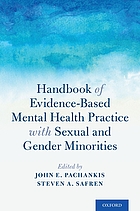
Handbook of Evidence-Based Mental Health Practice with Sexual and Gender Minorities
Pachankis, J. E., & Safren, S. A. (Eds.). (2019).
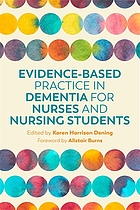
Evidence-Based Practice in Dementia for Nurses and Nursing Students
Burns, A. S. (2019).
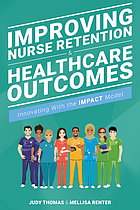
The PEACE Model for Evidence-Based Practice for Clinical Nurses
Rivera, R. R., & Fitzpatrick, J. J. (2021).
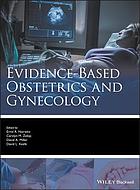
Evidence-Based Obstetrics and Gynecology
Norwitz, E. R., Zelop, C. M., Miller, D. A., & Keefe, D. (Eds.). (2019).
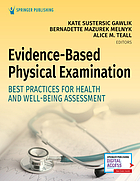
Evidence-Based Physical Examination : Best Practices for Health & Well-Being Assessment
Gawlik, K., Melnyk, B. M., & Teall, A. M. (Eds.). (2021).
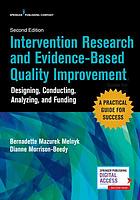
Intervention Research and Evidence-Based Quality Improvement, Second Edition : Designing, Conducting, Analyzing, and Funding
Melnyk, B. M., & Morrison-Beedy, D. (Eds.). (2019).


